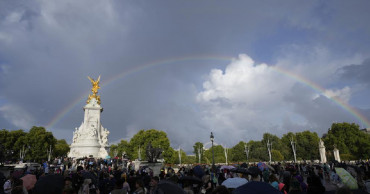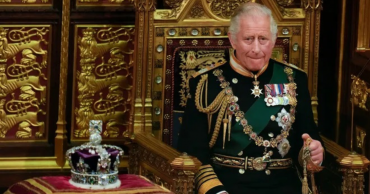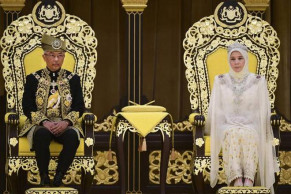king
SRK’s King to release on Dec 24, 2026
The release date announcement of Shah Rukh Khan–starrer King has created a buzz online, with fans and film personalities reacting with excitement. The film is set to hit theatres on December 24, 2026.
Director Siddharth Anand unveiled a teaser video announcing the release date, showing Shah Rukh Khan in a powerful new look. In the clip, the actor urges viewers to be ready for an intense year-end release.
Shah Rukh Khan’s son Aryan Khan shared the video on his Instagram Stories, writing a brief reaction that quickly caught fans’ attention. Filmmaker Karan Johar also shared the teaser and praised the announcement, saying it took the internet by storm.
Earlier, on Shah Rukh Khan’s birthday last year, Siddharth Anand had revealed the film’s title, marking their second collaboration after Pathaan. The title reveal was presented as a special tribute to the actor’s long career.
The teaser hints at a high-energy action film, featuring Shah Rukh Khan in a striking avatar that fans have not seen before.
Produced by Red Chillies Entertainment and Marflix Pictures, King also stars Deepika Padukone, Suhana Khan and Abhishek Bachchan. The film is expected to be a major action release of 2026.
With inputs from NDTV
1 month ago
King of the Netherlands apologizes for country's role in slavery on 150th anniversary of abolition
King Willem-Alexander of the Netherlands apologized Saturday for his country's role in slavery and asked for forgiveness during a historic speech greeted by cheers and whoops at an event to commemorate the anniversary of the abolition of slavery in Dutch colonies.
The king's speech followed Dutch Prime Minister Mark Rutte's apology late last year for the country's role in the slave trade and slavery. The public expressions of remorse are part of a wider reckoning with colonial histories in the West that the Black Lives Matter movement spurred in recent years.
In his emotional address, Willem-Alexander referred back to the prime minister's apology as he told a crowd of invited guests and onlookers: "Today, I stand before you. Today, as your king and as a member of the government, I make this apology myself. And I feel the weight of the words in my heart and my soul."
Riots in Belgium, Netherlands after Morocco win at World Cup
The king said he has commissioned a study into the exact role of the royal House of Orange-Nassau in slavery in the Netherlands.
"But today, on this day of remembrance, I ask forgiveness for the clear failure to act in the face of this crime against humanity," he added.
Willem-Alexander's voice appeared to break with emotion as he completed his speech before laying a wreath at the country's national slavery monument in an Amsterdam park.
Some people want action to back up the words.
"Honestly, I feel good, but I am still looking forward to something more than just apologies. Reparations, for example," Doelja Refos, 28, said.
"I don't feel like we're done. We're definitely not there yet," Refos added.
Study in the Netherlands: Scholarship Opportunities for Bangladeshi Students
Former lawmaker John Leerdam told Dutch broadcaster NOS that he felt tears running down his cheeks as the king apologized. "It's a historic moment and we have to realize that," he said.
Slavery was abolished in Suriname and the Dutch colonies in the Caribbean on July 1, 1863, but most of the enslaved laborers were forced to continue working on plantations for another decade. Saturday's commemoration and speech started a year of events to mark the 150th anniversary.
Research published last month showed that the king's ancestors earned the modern-day equivalent of 545 million euros ($595 million) from slavery, including profits from shares that were effectively given to them as gifts.
When Rutte apologized in December, he stopped short of offering compensation to descendants of enslaved people.
Instead, the government is establishing a 200 million-euro ($217 million) fund for initiatives that tackle the legacy of slavery in the Netherlands and its former colonies and to improve education about the topic.
That isn't enough for some in the Netherlands. Two groups, Black Manifesto and The Black Archives, organized a protest march before the king's speech Saturday under the banner "No healing without reparations."
Bangladesh Film Archive signs MoU with RedOrange of Netherlands to collect 1971 war footage
"A lot of people including myself, my group, The Black Archives, and the Black Manifesto say that (an) apology is not enough. An apology should be tied to a form of repair and reparatory justice or reparations," Black Archives director Mitchell Esajas said.
Marchers wore colorful traditional clothing in a Surinamese celebration of the abolition of slavery. Enslaved people were banned from wearing shoes and colorful clothes, organizers said.
"Just as we remember our forefathers on this day, we also feel free, we can wear what we want, and we can show the rest of the world that we are free." Regina Benescia-van Windt, 72, said.
The Netherlands' often brutal colonial history has come under renewed and critical scrutiny in the aftermath of the killing of George Floyd, a Black man, in the U.S. city of Minneapolis on May 25, 2020, and the Black Lives Matter movement.
A groundbreaking 2021 exhibition at the national museum of art and history took an unflinching look at slavery in Dutch colonies. In the same year, a report described the Dutch involvement in slavery as a crime against humanity and linked it to what the report described as ongoing institutional racism in the Netherlands.
The Dutch first became involved in the trans-Atlantic slave trade in the late 1500s and became a major trader in the mid-1600s. Eventually, the Dutch West India Company became the largest trans-Atlantic slave trader, according to Karwan Fatah-Black, an expert in Dutch colonial history and an assistant professor at Leiden University.
BEMEA seeks more collaboration with Netherlands to enhance RMG industry’s competitiveness
Authorities in the Netherlands aren't alone in saying sorry for historic abuses.
In 2018, Denmark apologized to Ghana, which it colonized from the mid-17th century to the mid-19th century. King Philippe of Belgium has expressed "deepest regrets" for abuses in Congo. In 1992, Pope John Paul II apologized for the church's role in slavery. Americans have had emotionally charged disputes over taking down statues of slaveholders in the South.
In April, King Charles III for the first time signaled support for research into the U.K. monarchy's ties to slavery after a document showed an ancestor with shares in a slave-trading company, a Buckingham Palace spokesperson said.
Charles and his eldest son, Prince William, have expressed their sorrow over slavery but haven't acknowledged the crown's connections to the trade.
During a ceremony that marked Barbados becoming a republic two years ago, Charles referred to "the darkest days of our past and the appalling atrocity of slavery, which forever stains our history." English settlers used African slaves to turn the island into a wealthy sugar colony.
Willem-Alexander acknowledged that not everybody in the Netherlands supports apologies, but he called for unity.
"There's no blueprint for the process of healing, reconciliation and recovery," he said. "Together, we are in uncharted territory. So let's support and guide each other."
2 years ago
Thai man gets 2-year term for calendar said to mock king
A Thai man was sentenced to two years in prison Tuesday for selling calendars featuring satirical cartoons of yellow ducks that a court said mocked the country’s monarch, a legal aid group said.
Bangkok’s Criminal Court ruled that the calendar for 2021 containing pictures of yellow ducks in poses resembled and ridiculed Thailand’s King Maha Vajiralongkorn, diminishing his reputation, the group Thai Lawyers for Human Rights said.
Yellow rubber ducks were at one point a tongue-in-cheek symbol of Thailand’s pro-democracy protest movement.
Also Read: Thailand reinstates foreign arrival vaccination requirement
Narathorn Chotmankongsin was charged under Thailand’s lese majeste law, which calls for three to 15 years’ imprisonment for anyone who defames, insults or threatens the king, the queen, the heir apparent or the regent.
The court declared that six illustrations in the calendar were made to mock the king.
The legal aid group said the 26-year-old defendant, whom it identified by the nickname Ton Mai, had his sentence reduced to two years because he cooperated with the court.
Human Rights Watch issued a statement Wednesday asking Thai authorities to “quash the sentence and promptly release Narathorn Chotmankongsin."
Also Read: 50 years of ties with Thailand: Dhaka calls for regional cohesion
“The prosecution and three-year sentence of a man for selling satirical calendars shows that Thai authorities are now trying to punish any activity they deem to be insulting the monarchy,” said Elaine Pearson, Asia director at Human Rights Watch. “This case sends a message to all Thais, and to the rest of the world, that Thailand is moving further away from — not closer to — becoming a rights-respecting democracy.”
The lese majeste law has long drawn criticism for its harshness and a provision allowing anyone to file a complaint, allowing its use for partisan political purposes. In recent years, it has become a focus of pro-democracy activists, who have called for it to be amended or abolished.
Two young female activists seeking its repeal and other judicial reforms are reportedly in critical condition after hunger striking for more than six weeks.
At least 233 people have been charged with lese majeste since November 2020 according to Thai Lawyers for Human Rights. Before that, prosecutions had been informally suspended, bThaut they were revived as the protest movement gained strength and made increasingly strong criticisms of the monarchy.
The demands to reform the monarchy have been controversial because by tradition, the institution has been considered untouchable and one of the main foundations of Thai nationalism.
2 years ago
UK already wondering whether King Charles will depart from his mother’s traditions
As the United Kingdom mourns a beloved queen, the nation is already wondering how King Charles III will reign and whether his monarchy will depart from the traditions of his mother.
If his first full day on the throne is any indication, Charles seemed ready to chart at least a slightly different course.
When Charles traveled to Buckingham Palace for the first time as the new king Friday, his limousine snaked through a sea of spectators then stopped short of the palace gates before he got out and shook hands with well-wishers. Charles looked more like a U.S. president on the campaign trail than the latest steward of a 1,000-year-old hereditary monarchy.
It’s not that Queen Elizabeth II didn’t meet her subjects. She did, often. But this felt different — a bit less formal, a bit more relaxed and personal. Charles spent almost 10 minutes greeting people pressed up against the crowd-control barriers, smiling, waving, accepting condolences and the occasional bouquet of flowers as the audience broke out in a chorus of “God Save the King.”
After inspecting the tributes to his mother lined up outside the palace, he waved once more and walked through the gates with Camilla, the Queen Consort.
“It was impressive, touching, a good move to come out to the crowds,” said Ammar Al-Baldawi, 64, a retiree from Hertfordshire who was among the throngs outside the palace. “I think that’s where the royal family needs to communicate with the people now.”
Charles’ efforts to engage with the public more intimately reflect the fact that he needs their support. There are difficult issues ahead, most pressingly how the 73-year-old king will carry out his role as head of state.
The laws and traditions that govern Britain’s constitutional monarchy dictate that the sovereign must stay out of partisan politics, but Charles has spent much of his adult life speaking out on issues that are important to him, particularly the environment.
His words have caused friction with politicians and business leaders who accused the then-Prince of Wales of meddling in issues on which he should have remained silent.
The question is whether Charles will follow his mother’s example and muffle his personal opinions now that he is king, or use his new platform to reach a broader audience.
In his first speech as monarch, Charles sought to put his critics at ease.
“My life will of course change as I take up my new responsibilities,″ he said. “It will no longer be possible for me to give so much of my time and energies to the charities and issues for which I care so deeply. But I know this important work will go on in the trusted hands of others.”
Ed Owens, a historian and author of “The Family Firm: Monarchy, Mass Media and the British Public, 1932-53,” said that while Charles will tread a careful path, it’s unlikely he will suddenly stop talking about climate change and the environment — issues where there is a broad consensus about the urgent need for action.
“To not do so would not be true to the image that he has until this moment developed,” Owens said.
John Kerry, the U.S. special envoy for climate, said he hopes Charles will continue speaking out about climate change because it is a universal issue that doesn’t involve ideology. Kerry was in Scotland to meet with the Prince of Wales this week, but the session was canceled when the queen died.
“It doesn’t mean he’s involved in the daily broil of politics or speaking for a specific piece of legislation,” Kerry told the BBC. “But I can’t imagine him not … feeling compelled to use the important role of the monarch, with all the knowledge he has about it, to speak out and urge the world to do the things the world needs to do.”
Constitutional lawyers have debated for years whether Charles has pushed the boundaries of conventions designed to keep the monarchy out of the political fray.
His so-called Black Spider Memos — named for his spidery handwriting — to government ministers have been cited as evidence that he wouldn’t be neutral in his dealings with Parliament.
The debate has also spilled over into fiction.
In the 2014 play “King Charles III,” playwright Mike Bartlett imagines the new king, uncertain of his powers and moved by his conscience, causing a constitutional crisis by refusing to sign a new law restricting press freedom.
It is an illustration of the tensions inherent in a system that evolved from an absolute monarchy to one in which the sovereign plays a largely ceremonial role. While Britain’s unwritten constitution requires that legislation must receive royal assent before it becomes law, this is considered a formality that the monarch cannot refuse.
In an interview for a 2018 documentary broadcast on his 70th birthday, Charles said he would behave differently when he became king because the monarch has a different role than the Prince of Wales.
Even so, he questioned the criticism he has received over the years.
Read: When Queen Elizabeth II came to Bangladesh
“I’ve always been intrigued if it’s meddling to worry about the inner cities, as I did 40 years ago, and what was happening or not happening there, the conditions in which people were living,” he wondered. “If that’s meddling, I’m very proud of it.”
On another issue facing the new king, Charles has said clearly that he intends to reduce the number of working royals and cut expenses as he seeks to ensure the monarchy better represents modern Britain.
Robert Lacey, a royal historian and adviser on the Netflix series “The Crown,” said this initiative underscores the important role of Prince William, who is now heir to the throne.
William has already made the environment one of his primary issues, and he is likely to take an even more prominent role in this area now that his father is king, Lacey told the BBC.
But there is another clue to the new king’s plans for his reign, and that’s his choice of a name.
Before Elizabeth’s time, there was a tradition that British monarchs would choose a new name when they ascended the throne. Charles’ grandfather, for instance was known as Bertie before he became King George VI. There was some thought Charles would choose to be known as King George VII in honor of his grandfather.
Read: Tears and tributes for Queen across the world
But Charles rejected the idea and kept his own name. That’s a “clear message” that the king will continue to champion the causes he backed as Prince of Wales, Lacey said.
It was his father, Prince Philip, who identified ways in which the neutral monarchy could advocate for youth development and the environment — “really important causes that they could push forward without being accused of partisanship,” he said.
3 years ago
It may be months or even longer before Charles’ formal coronation
The British monarchy’s rules state that “a new sovereign succeeds to the throne as soon as his or her predecessor dies.”
That means Queen Elizabeth II’s eldest son, Prince Charles, became king immediately upon her death.
However, it may be months or even longer before Charles’ formal coronation. In Elizabeth’s case, her coronation came on June 2, 1953 -- 16 months after her accession on Feb. 6, 1952, when her father, King George VI, died.
A look at the formalities that take place after Charles accedes to the throne:
— Within 24 hours of a monarch’s death, a new sovereign is proclaimed formally as soon as possible at St. James’s Palace in London by the “Accession Council.” This is made up of officials from the Privy Council, which includes senior Cabinet ministers, judges and leaders of the Church of England, who are summoned to the palace for the meeting.
— Parliament is then recalled for lawmakers to take their oaths of allegiance to the new monarch.
— The new monarch will swear an oath before the Privy Council in St. James’s Palace to maintain the Church of Scotland, according to the Act of Union of 1707.
— The proclamation of the new sovereign is then publicly read out at St. James’s Palace, as well as in Edinburgh, Cardiff and Belfast – the capital cities of the four nations that make up the United Kingdom.
— Charles must declare to Parliament on the first day of its session following the accession, or at the coronation, whichever is first, that he is a faithful Protestant. The oath is mandated by the Accession Declaration Act of 1910.
— He must also take a coronation oath as prescribed by the Coronation Oath Act of 1689, the Act of Settlement of 1701 and the Accession Declaration Act.
— He must be in communion with the Church of England, a flexible rule which allowed King George I and King George II to reign even though they were Lutherans.
Also read: Queen Elizabeth II: Britain's longest reigning monarch, no more
3 years ago
At age 73, Charles becomes King
Queen Elizabeth II represented stability for many people in the UK and elsewhere during the transformations of the 20th and 21st centuries. Upon her passing, Prince Charles, her eldest offspring and heir to the throne, assumed the crown.
“The death of my beloved mother, Her Majesty The Queen, is a moment of great sadness for me and all members of my family,” the new king shared in a statement released by Buckingham Palace.
Read 10 things to know about Queen Elizabeth II’s life
“We mourn profoundly the passing of a cherished Sovereign and a much-loved mother. I know her loss will be deeply felt throughout the country, the Realms and the Commonwealth, and by countless people around the world.
“During this period of mourning and change, my family and I will be comforted and sustained by our knowledge of the respect and deep affection in which the Queen was so widely held,” Charles wrote.
Read Queen Elizabeth II: Britain's longest reigning monarch, no more
3 years ago
Malaysia's new king calls for racial unity at coronation
Kuala Lumpur, Jul 30 (AP/UNB) — Malaysia's sports-loving Sultan Abdullah Sultan Ahmad Shah called for racial unity as he was installed Tuesday as the country's 16th king under a unique rotating monarchy system.
6 years ago












